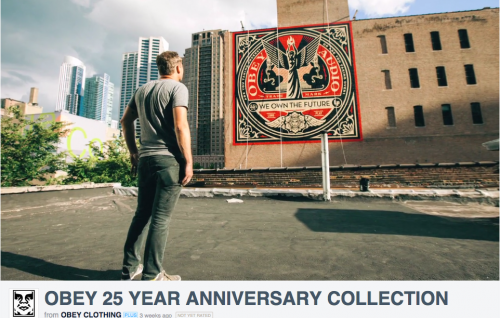OBEY 25 Year Anniversary Collection
When I made the first OBEY sticker in 1989, I never thought I was beginning a project that would inspire and permeate most of my art career for the next 25 years and counting. It’s a surreal reality to be celebrating 25 years of Obey and I’m thankful for my partners at Obey Clothing to help tell my story.
-Shepard
OBEY 25 YEAR ANNIVERSARY COLLECTION from OBEY CLOTHING on Vimeo.
When I made the first OBEY sticker in 1989, I never thought I was beginning a project that would inspire and permeate most of my art career for the next 25 years and counting.
At 19, I had no idea what I would be doing this a week later, much less a decade or two. Putting up stickers was fun, and that was enough to get the ball rolling. The act of getting out there for the journey without a brilliant plan or destination opened my eyes to the world as a participant, not a voyeur. Part of the success of OBEY Giant has been its organic evolution based on my constant dialogue the public and broadening perspective through my experiences. Rather than being constrained by the OBEY Giant, I’ve modeled it to reflect my personality and my interests as they’ve progressed over the years.
When I was young, I bought into the typical black-and -white, us -versus-them simplification of things: provocation and silliness cant mix, a job has to be drudgery, passion is reserved for the nights and weekends and art cant be pure if it has commercial facets. All that began to seem less valid as very small accomplishment with OBEY Giant made it seem increasingly possible to do things my way.
It hasn’t been an easy path. Even though financial struggles, failed relationships, a lack of resources, and 16 arrests, I was always determined to keep OBEY Giant project growing. Essentially. I succeeded at building something from nothing and creating a demand for it by exploiting the semiotics of consumption.
From the beginning, OBEY Giant opened my eyes to many facets of capitalism and consumer-trends psychology that revolve around supply and demand economic theory. Some examples (“I want a sticker because I like the way it looks”) are relatively straightforward while others (“I want a sticker because my rebellious friends have it’) reflect the complex irony of conforming to an image of rebellion to gain acceptance. The OBEY Giant images have raised many issues around the concept of value: as they gained more exposure and familiarity, their value increased to marketers wishing to capitalize on the rebellious outsiders who used OBEY Giant and the Variables determining who embraced or rejected it along the way has been the most valuable aspect of the project.
I knew early on that, more than being just a vehicle for my art, commentary, and mischiefs, OBEY Giant could provide a “case study”. The hardest thing was for me to decide when I had enough material to release a complete case study, especially when the accumulation of art and experiences showed no sign of slowing. Keep your eyes and mind open, and question everything.
– Shepard Fairey

